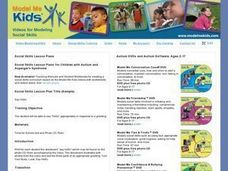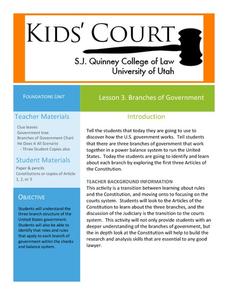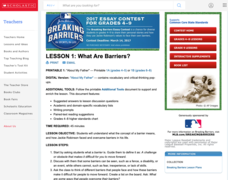Curated OER
Social Skills For Autism
Designed for pupils with special needs, such as autism, this lesson calls for learners to practice saying hello to others. The teacher begins by modeling the behavior she expects and practicing with each pupil before pairing learners...
Curated OER
Lesson 2: The Constitution: Our Guiding Document
Explore the structure and content of the US Constitution in the second lesson of this five-part social studies series. A collection of activities, games, and videos complement a class reading of a document summarizing the US...
Channel Islands Film
Once Upon A Time (Saxipak’a): Lesson Plan 1
As part of a study of the history of the Chumash on California's Channel Island chain, class members view the documentary Once Upon a Time, respond to discussion questions, and create a timeline for the different waves of migration.
American Battlefield Trust
Civil War Overview: Elementary Lesson Plan
How do you teach the Civil War and all its intricacies within the time limits of an average school day? Using a three-part plan, teachers easily integrate coverage of key Civil War battles into the unit. The lesson includes activities to...
Curated OER
What We Eat, Where We Sleep: Documenting Daily Life to Tell Stories
This is not just a New York Time article to read, this is a set of amazing activity ideas all related to the slide shows "Breaking Bread Everywhere" and "Where Children Sleep." Your class can view each show, read about what they mean...
Lesson Snips
Lessons from the Holocaust
Connect global examples of attempted genocide with a well-designed social studies lesson. It includes an excellent informational text with background information on the Holocaust, as well as worksheets, book report guidelines, and...
National Endowment for the Humanities
Revolution '67, Lesson 1: Protest: Why and How
To some people, protesting is as American as apple pie, but the factors that lead to protests can be as confusing to veteran activists as to today's youth. Revolution '67 explores the riots in Newark, New Jersey as a case study. Using...
NPR
Suffrage Lesson Plan
Has life changed for American women in the last century, or are there common themes between the lives of 21st century women and the struggle of suffragettes from the 1910s? Explore the ways media reflects the position of women in the...
National Endowment for the Humanities
Revolution '67, Lesson 2: What Happened in July 1967? How Do We Know?
Even in a world in which dozens of participants and curious onlookers record every controversial event, the basic facts of what happened are often in dispute. Revolution '67, Lesson 2 explores 1967 Newark, New Jersey using an examination...
Teaching Tolerance
Using Photographs to Teach Social Justice | Exposing Anti-Immigration Sentiment
The debate about immigration reform continues. To gain a deeper understanding of the issues involved, class members first examine a photo of an anti-immigration rally. Groups then conduct an internet search for an image that presents an...
Teaching Tolerance
Using Photographs to Teach Social Justice | Supporting Social Border Crossings
A lunch-time activity encourages pupils to step out of their usual lunch bunch and connect with someone new. To begin, individuals examine a group photograph and identify what they believe is the gender, race, religion, and sexual...
Curated OER
Lesson 1: The Importance of Rules in Our Country and in Our Classroom
Explore the importance of rules in a community with the engaging first lesson of this series on the US government. To begin, children play a paper clip game that requires them to make up their own rules as they go, after which the...
Curated OER
Lesson 3: Branches of Government
Young historians climb through the three branches of the US government in the third lesson of this five-part series. While reading the first three Articles of the Constitution in small groups, children write facts on paper leaves that...
Civil War Trust
Civil War Personalities Lesson Plan
Caring, trustworthiness, and responsibility—these are only a few character traits in focus of a lesson based on stories from the Civil War era. Class members explore several influential lives while reading biographies that highlight...
Curated OER
Lesson 4: The Judiciary: A Brief Introduction to the Courts System
Focusing on the judicial branch of government, the fourth lesson in this series explores the structure of the US courts system. Beginning with an engaging activity based on the short story The Lady or the Tiger, students go on to examine...
Public Schools of North Carolina
Democratic Republic of Congo - Map Skills
Work on your map skills with a packet of activities about the river basins in the Democratic Republic on Congo. Learners study the maps provided before answering the geography questions and writing an acrostic poem about the region.
Channel Islands Film
Arlington Springs Man: Lesson Plan 4
West of the West's documentary Arlington Springs Man introduces viewers to the remarkable finds on Santa Rosa Island. Archaeologist have discovered on this small island that is part of the Channel island chain, human and pygmy mammoth...
Center for History and New Media
Slavery and Free Negroes, 1800 to 1860
What was life like for enslaved and free black people before the American Civil War? Explore the building tension between states and the freedom of individuals with a thorough social studies lesson. Learners of all ages explore primary...
Center for Civic Education
What Basic Ideas About Government Are Included in the Preamble to the Constitution?
Young historians explore the meaning of the Preamble to the US Constitution in this upper-elementary social studies lesson. Working with partners or in small groups, children discuss the purpose of government before reading and analyzing...
Curated OER
Homophobia: What is It? What Can We Do About It?
A two-part lesson focuses on the sensitive issues of homophobia, discrimination, sexuality, and gender. Middle schoolers discuss individual and institutional discrimination, personal rights, homosexuality, and bullying.
Scholastic
Lesson 1: What Are Barriers?
Scholars discuss the concept of a barrier with a short passage on Jackie Robinson. The writing process begins with a paragraph and several other sentences about Robinson's unique traits that made breaking a barrier possible.
Albert Shanker Institute
Who Was Bayard Rustin?
Who was Bayard Rustin? Pupils analyze a series of primary source documents to learn about this important figure in the civil rights movement. The lesson contains a short film to watch along with guiding questions and other resources...
Teaching Tolerance
Using Photographs to Teach Social Justice | Confronting Unjust Practices
A powerful photograph of the Freedom Riders of 1961 launches an examination of the de jure and de facto injustices that the civil rights movement of the 1950s and 1960s addressed. Young historians first watch a video and read the Supreme...
Facing History and Ourselves
Transcending Single Stories
The focus of the second lesson in the Standing Up for Democracy unit is on the power of assumptions based on a single experience or point of view. Class members begin by journaling about assumptions others make about their identity based...

























